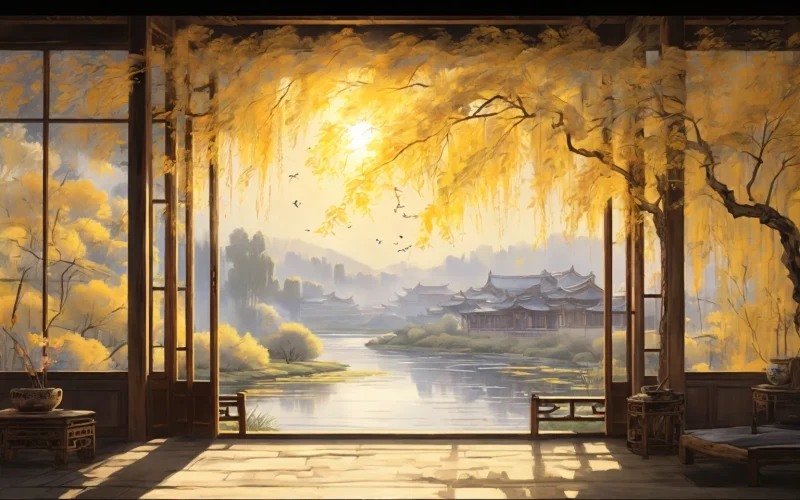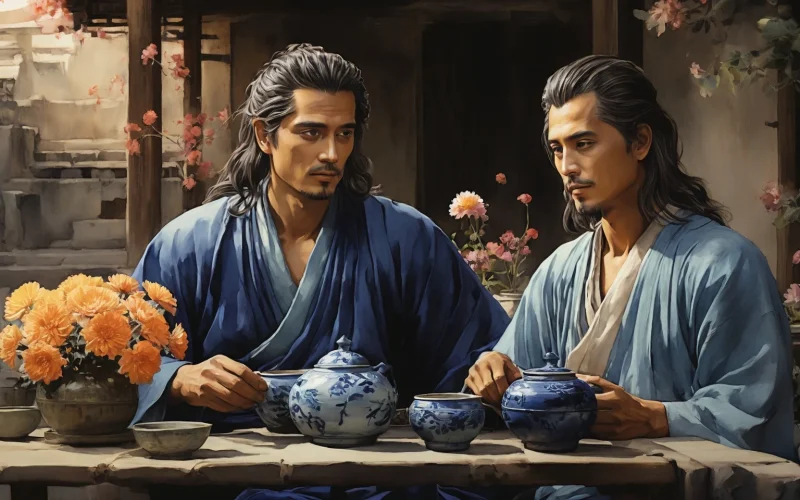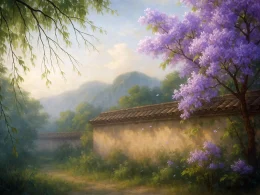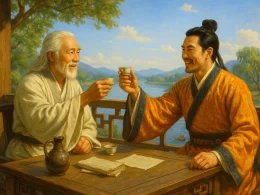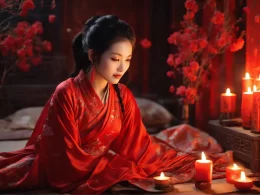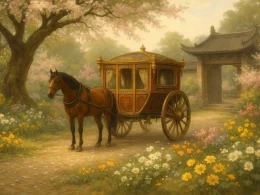At dawn official drumbeats hasten the sunrise;
At dusk the booming drums call the moon to the skies.
When yellow willows put forth new buds in the town,
In tomb is buried the favorite of the crown.
The drums have boomed a thousand years, still shines the sun,
But ancient emperors of Qin and Han have done.
Your hair once black may turn white as reed flowers stand,
The drums with southern hills will ever guard our land.
Even immortals were buried in the sky,
The drumbeats and the water-clock will never die.
Original Poem:
「官街鼓」
李贺
晓声隆隆催转日,暮声隆隆呼月出。
汉城黄柳映新帘,柏陵飞燕埋香骨。
磓碎千年日长白,孝武秦皇听不得。
从君翠发芦花色,独共南山守中国。
几回天上葬神仙,漏声相将无断绝。
Interpretation:
"Official Drums" is a seven-character ancient poem written by the Tang Dynasty poet Li He. Through the depiction of the sound of the Guanjie Drum, the poet contrasts the intangible nature of time and the fleeting nature of life with the infinite universe and the eternal drumbeat. This expresses a profound lament for the passage of time. Li He, who died young and lived at the bottom of society, often felt the brevity of life and was particularly sensitive to the changes of the world, making his reflections on the passage of time even deeper.
First Couplet: “晓声隆隆催转日,暮声隆隆呼月出。”
(The morning drum beats loudly, urging the sun to rise; the evening drum beats again, calling the moon to rise.)
These lines depict the grand scene of the alternation between day and night, with the drum sound symbolizing the passage of time, creating a sense of the eternal cycle of the universe.
Second Couplet: “汉城黄柳映新帘,柏陵飞燕埋香骨。”
(The yellow willows of Han City reflect the new curtains, while the flying swallows of Bailin bury fragrant bones.)
These lines contrast the natural beauty of spring with the transient nature of life. The yellow willows and the swallow’s remains symbolize the impermanence of life and the changes in human affairs, in stark contrast to the eternal drumbeats.
Third Couplet: “磓碎千年日长白,孝武秦皇听不得。”
(The fragments of a thousand years of history are torn apart by the drumbeats, while the sun and moon continue to shine; however, Emperor Wu of Han and Emperor Qin Shi Huang can no longer hear this drumbeat.)
The poet reflects on the fragility and brevity of human life by contrasting the death of historical figures. While time continues, the drum’s sound remains eternal, highlighting time’s relentless passage and the fleeting nature of human existence.
Fourth Couplet: “从君翠发芦花色,独共南山守中国。”
(From your side, black hair shines like reed flowers, but in the end, you guard the Southern Mountains, maintaining the history of China alone.)
These lines explore the aging process and the continuation of history, reminding people to cherish every moment of life and to understand that history marches on regardless of individual lives.
Fifth Couplet: “几回天上葬神仙,漏声相将无断绝。”
(How many times have immortals been buried in the heavens, yet the sound of the leaking water continues without end.)
Finally, the poet uses the death of immortals to emphasize the relentlessness of time, revealing that even immortals cannot escape death, and the passage of time continues unabated.
Writing Features:
Li He’s approach in this poem is highly symbolic. Through the depiction of the drum’s sound, he cleverly materializes the abstract concept of time, giving it life and voice. The poet uses contrast to highlight not only the brevity of human life but also the eternity of history and the universe. This deeply expresses his sense of helplessness toward the passage of time and the fate of human life.
Overall Appreciation:
This poem, through the repetitive depiction of the drumbeat, symbolizes intangible time and contrasts it with the brevity of human life and the longevity of history. Through reflecting on the pursuit of immortality by ancient emperors, the poet conveys the futility of such desires and the inevitable passage of time. Each couplet advances the theme step by step, using vivid contrasts and rich symbolism to reveal the fragility of life and the grand scale of history. The poem is artistically exceptional, combining profound reflection with intense emotional expression.
Insights:
"Official Drums" uses contrast and symbolism to demonstrate the relentlessness of time and the limits of human life. This teaches us to cherish the present moment and face the fleeting nature of life head-on. Even ancient emperors could not escape the constraints of time, and the desire for immortality ultimately proved futile. We must recognize that the true value of life lies in how we live each moment, not in empty dreams of eternity.
Poem translator:
Xu Yuan-chong (许渊冲)
About the poet:
Li He (李贺), circa 790 - 817, was a native of Luoyang, Henan Province, and a Romantic poet of the Middle Tang Dynasty.






